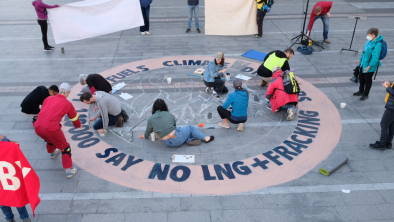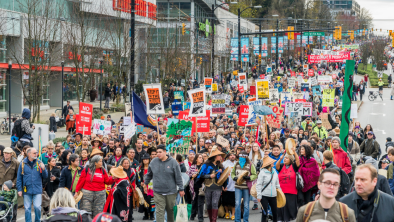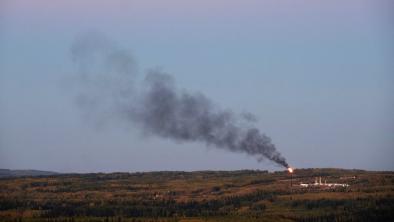Upper Pitt named B.C.'s most endangered river
Vancouver Sun
METRO VANCOUVER - A prized Lower Mainland stream that touched off a
provincial controversy about small-hydro projects has been named British
Columbia's most endangered river for 2008.
Fears that the exceptional fish and wildlife values of the Upper Pitt River system
could be devastated by plans for a proposed industrial-scale power project lifted
the Upper Pitt to the top of the Outdoor Recreation Council's annual list of B.C.'s
most endangered rivers, council spokesman Mark Angelo said in an interview.
"The Upper Pitt is a jewel amongst B.C. rivers," said Angelo, a recipient of the
Order of Canada and the Order of British Columbia, adding that the threats posed
by a series of independent power projects on the Pitt "resonated with people
across this province."
Others near the top of this year's list, which is being released today by the
council, include the Flathead River in southeast B.C., and the Fraser River -
particularly the section between Chilliwack and Mission that is facing urban
development pressures.
BC Hydro accepted in 2006 a project proposal by Run of River Power, a penny
stock company listed on the Toronto Venture Exchange, to create a complex of
seven power-generating stations on tributaries of the Upper Pitt. The project has
a claimed value of $350 million.
Run of River Power has one functioning asset, a money-losing micro-hydro
generating project at Brandywine Creek.
The Upper Pitt project also requires the construction through Pinecone Burke
Provincial Park of a 4.6-kilometre long voltage power line in a 46-metre-wide
right-of-way clearing.
Fire marshals were forced to close a public meeting on the project two weeks ago
in Pitt Meadows when the crowd of opponents exceeded the capacity of the
meeting room in a local motel.
A new meeting has been scheduled for this Tuesday, March 25, at Pitt Meadows
secondary school beginning at 4 p.m., with a townhall session beginning at 6:30
p.m.
Angelo said he expects turnout will exceed 800 people.
The Upper Pitt last topped the council's endangered rivers list in 2000, when
public outcry over a proposed gravel mine eventually forced the provincial
government to buy out a mining company's interest in the area.
Pitt River Lodge owner Dan Gerak said in a telephone interview that when he first
learned of the project, he assumed run-of-river hydro development would have
minimal impact on the Upper Pitt system.
"It's not until you go look at a project for yourself that you realize these are
bigger than a major gravel operation, when you look at the land they are moving,
the rock they have to blast, and the pipes and dams they have to put in," said
Gerak, who was unaware of the council's ranking at the time of the interview.
"I'm not surprised that it has hit the top of the list again," Angelo said. "You are
talking about the diversion of eight tributaries, the construction of seven power
houses, all within a 12-kilometre stretch of the Upper Pitt's mainstem.
"The clustering of power projects along the Upper Pitt has raised serious concerns
amongst a lot of people about the potential for adverse impacts to the river and
its fish stocks.
"By the time you look at roads, infrastructure, power houses, power lines, you
are talking about a project that's going to have a major footprint, so it is
generating a lot of concern."
The Flathead River was number one on the 2007 list, and remains prominent at
number two this year because of continuing concern about a proposed coal mine,
Angelo said, noting that the portion of river on the U.S. side of the border is a
protected waterway.
"It supports a very important trans-boundary fish population and perhaps the
highest density of inland grizzly bears anywhere in North America - yet while the
U.S. section is protected, the B.C. section is not."
He said it would make more sense to expand existing coal mining operations in
the southeast region, rather than "industrialize a brand new valley."
The Fraser River is in the top five for the 15th time in 16 years. In 2008, it shares
second place on the basis of longstanding issues such as sewage and pollution -
but Angelo said there are "a host of emerging issues as well."
"There is growing concern about the potential for much more developing along
the Fraser's most productive stretch between Hope and Mission.
"That's one of the most productive stretches of river anywhere in the world but
given some of the growth pressures we are starting to see now, I think there is
growing concern that there is not any kind of collaborative plan to protect that
corridor."
Rounding out the list, which includes 13 streams this year, are:
Taku River in northwestern B.C., where threats include a proposed mine, and acid
mine drainage.
Peace River, for a hydroelectric dam proposal at Site C near Fort St. John.
Headwaters of the Skeena, Nass and Stikine Rivers, for proposed exploration and
development of coalbed methane resources.
Kettle River near Grand Forks, for water extraction, development, and a power
project proposal.
Coquitlam River, for excessive sedimentation due to gravel mining, and
urbanization.
Glacier/Howser Creeks, near Kaslo, for a power project proposal.
Coldwater River, a tributary of the Thompson River, for water extraction.
Okanagan River, for a host of ills including channelization, water extraction,
urban encroachment, riparian habitat loss and the building of dams and weirs.
Salmon River, near Salmon Arm, for low flows, pine beetle invasions killing trees
and affecting water resources in the region, and riverside habitat loss.
Little Campbell River in south Surrey, for development, agricultural impacts, and
water quality concerns.
ssimpson@png.canwest.com
© Vancouver Sun


